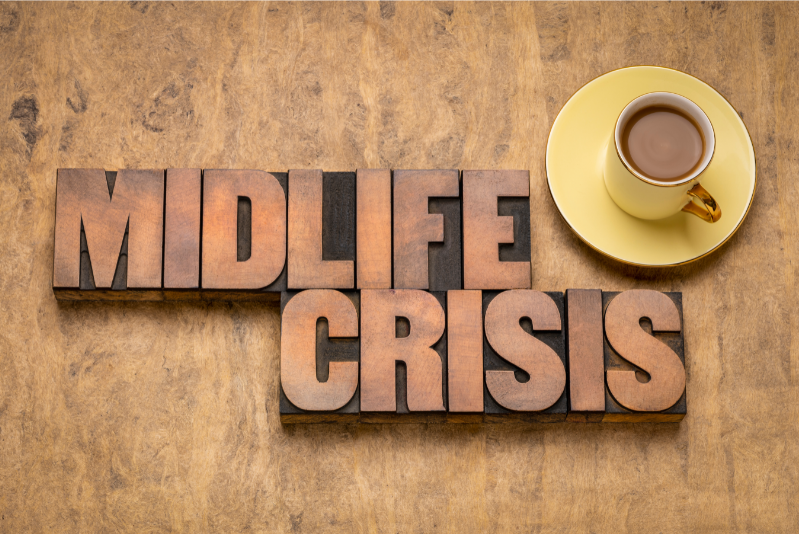
Life is full of twists and turns. From the minute we’re born, we strive to meet milestones. Whether it’s learning to walk, drive a car, graduate college or get married, it’s always go, go, go.
For the most part, we move through the early stages of our lives with vigor and excitement. However, looming over us is the threat of time. We are made to believe that the older we get, the less happy we’ll be.
Queue, the midlife crisis. This term invokes images of expensive sports cars, daring bucket list adventures, and emotional turmoil. And sure, some of us may experience turbulence during our 40s (and potentially 30s and 50s). However, that period of our lives isn’t destined to be all doom and demise.
Signs of a Midlife Crisis
Experts debate the idea of the midlife crisis; it’s considered somewhat of a Western myth. The term was created in 1965 by a psychoanalyst named Elliot Jacques. He noticed difficult changes in a middle-aged client, as well as himself.
Jacques believed that the awareness of our own mortality leads to loss and sadness. He also proposed other signs of a midlife crisis:
- A lack of purpose
- Self-doubt
- Distress due to changing roles and responsibilities
- Boredom
- Concerns with appearances and self confidence
- Changes in energy levels
- Low motivation to pursue goals
However, a midlife crisis isn’t an actual medical diagnosis, like depression or anxiety. Individual perception can vary drastically. Something, what we view as a crisis may be no biggie to someone else.
This makes it difficult for researchers to collect concrete data about the midlife crisis. In fact, a midlife crisis may be similar to any other emotional crisis we may experience.
Symptoms of an emotional crisis include:
- Mood changes, like feeling angry, irritable, sad, or anxious
- Sleeping disturbances
- Lack of personal hygiene
- Weight changes
- Withdrawal from activities and people
What Causes a Midlife Crisis?
A national survey asked people about their midlife crisis experiences. About 26% of them reported experiencing a midlife crisis. For most of these people, the crisis was triggered by a major event.
This suggests that events which often occur around middle age are the cause, not age itself.
Causes may include:
- Changing relationships (e.g., divorce)
- Loss of a loved one
- Children growing up/moving out
- Role changes (e.g., becoming a caregiver to aging parents)
- Health changes (e.g., illness, changes to physical ability)
- Reflection about life (e.g., regrets, missed opportunities, wondering what might have been)
- Ruminating on happier times
Generally, happiness tends to decline from our teenage years through our 40s. It then increases again during our 50s and onward.
However, our culture teaches us to fear aging. This may contribute to a midlife crisis, as we may worry that life is only bound to get worse.
How to Cope with a Midlife Crisis
At UCA, we believe that midlife is a time of positive transformation. Our Mid Life NO Crisis Kit outlines five facets of our lives that need attention during middle age:
- Body (exercise, nutrition, and health maintenance)
- Money (financial security and planning)
- Spirit (knowledge, passion, creativity)
- Relationships (building healthy connections)
- Mind (taking care of memory, continuous learning)
Coping strategies to try:
- Speak with a friend, or seek professional guidance (therapist, life coach, etc.)
- Consider what gives us purpose, when we feel happiest, and what we can do to take care of our needs.
- Consider who we value and enjoy being around.
- Do a life assessment. Consider what’s going right, what needs changing, and if our personal values are reflected in our lives.
- Set new goals. This helps give us direction and strive for the life we desire. As we grow, our goals may change. So, we should reassess them from time to time.
If we do find ourselves going through a low period during our middle years, we aren’t destined to suffer forever. Cliche or not, the first step is acceptance.
Whether we feel afraid (of loss, death, change), restless or aimless, we should be kind and patient with ourselves. Once we accept how we feel, we can plan for the path ahead.
Get the Mid Life NO Crisis Kit and embrace the adventures of middle age!
Sources
https://www.verywellmind.com/what-are-the-signs-of-a-midlife-crisis-4175827



